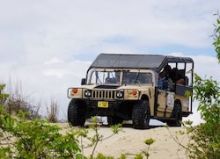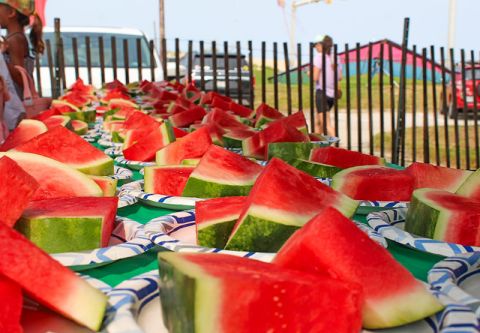
Taking comfort in the familiar is something many people have clung to over the last two years. Despite the many changes we see in our daily lives, it is nice to know that some things stay the same. For Outer Banks residents and visitors, that includes being able to make your way to the northern Currituck beaches to marvel at the wild horses.
When you arrive at Wild Horse Adventure Tours in Corolla, you are greeted by friendly staff and giant Hummers that are constantly maintained to safely accommodate your group on a tour to the off-road beaches where the wild horses live. Just seeing these vehicles undoubtedly raises your sense of excitement and anticipation, as the way the Hummers are constructed ensures a fantastic view of both the beach landscape and the descendants of Spanish mustangs who first washed up (literally) on the shores of the Outer Banks hundreds of years ago.
When Spanish explorers first wandered the coast of the Outer Banks (before it was called that, of course), they sought fortune and adventure. However, Mother Nature had other plans and cut the explorers’ plans short with treacherous sandbars and other hazards. When their ships ran aground at the shoreline, the explorers lightened their vessels by throwing off everything they could, including the horses themselves.
The horses managed to swim to shore and survived to roam their new home on the barrier islands. They began breeding and slowly adapting to their new environment during the ensuing centuries. At the height of their presence in what was later called America, thousands of horses could be found from the Virginia border all the way down to the Shackleford Banks. Today there are only two herds of wild Spanish mustangs left, one north of Corolla and the other on Shackleford Banks. The beach north of Corolla is home to about 100 horses, and that number has remained steady over the recent years.
“The horses are still having healthy foals, which is always what we are on the lookout for,” says Kasey Powell, Wild Horse Adventure Tour’s director of marketing.
The biggest threat to the wild horse population is humans, which is why feeding them and interacting with them in any way is illegal. Wild Horse Adventure Tours educates its tour-goers about these laws, and Corolla Wild Horse Fund, a nonprofit that helps protect the horses, has many ways of reminding people not to feed them. “More signage has been put up to help prevent a person from feeding the horses, which is extremely important to their health as colic is life-threatening in wild horses,” Kasey says.

Wild Horse Adventure Tours has been extremely busy over the last two years. The number of appointments for tours has risen sharply, particularly early and late in the season, as the number of visitors to the Outer Banks also increased. Booking tours early is encouraged.
While the vehicles are open-air, for extra COVID safety, Wild Horse Adventure Tours began making seats for its tours available by row, so customers don’t sit next to anyone who is not part of their group or family. Customers also have the option to rent an entire vehicle for themselves and their party.
Even though visitors typically watch the horses do a lot of the same things the typical beachgoer does at the Outer Banks – just being lazy on the beach, chowing down (although the horses like to munch on grass) or simply enjoying a leisurely stroll on the dunes – sometimes visitors have the opportunity to witness something extra special.

“We get to see one or two big territorial fights a year on tour, where a lone stallion fights another stallion to claim one of his mates or territory,” Kasey says. “You see very quickly how fast and strong these animals are, and you are happy to be at a safe distance in a Hummer!”
The horses are easy to spot, standing out by virtue of having black, brown or spotted coats, blond and dark manes, and swishing tails and twitching ears. The experienced Wild Horse Adventure Tour guides know how to get you close enough to take pictures while still maintaining a safe distance for the horses.
Unfortunately, the horses are considered critically endangered and are actually extinct in Spain, their ancestral home. But it’s not all bad news, as visitors learn that their participation in a Wild Horse Adventure Tour contributes to the company’s commitment to protecting these amazing creatures.
Wild Horse Adventure Tours is a significant donor to the Corolla Wild Horse Fund. The fund contributes to the maintenance of the horses’ sanctuary in order to keep them at a safe distance from the more heavily trafficked parts of Corolla. The fund also provides some medical care and makes a veterinarian available, if needed. Wild Horse Adventure Tours donates to an emergency medical fund for the horses and has purchased tracts of land to protect their sanctuary from development.

Community service is also part of the company’s ethos, including planting trees to offset their carbon emissions, keeping the beaches and roadways clean and always engaging in recycling. To date, the company has collected hundreds of pounds of trash along the Outer Banks beaches.
Rest assured, no tour featuring the wild horses is the same. Depending on the weather, time of year or a multitude of other variables, you will enjoy a new experience even if you’re an annual visitor to the Outer Banks or you call the area home. While seeing wild horses is not 100% guaranteed any time you venture out with Wild Horse Adventure Tours, you will be in the care of experienced tour guides familiar with the horses’ habitats and roaming routines, so your odds of seeing some horses are great! You can be sure that you will experience a fun, exciting activity that the entire family can enjoy, no matter what your family’s age range.
Each tour contributes to boosting the public’s awareness of both the wild horses and the protection of their environment so these amazing creatures can keep calling the Outer Banks home and be around for the public to observe and admire for years to come.

(252) 489-2020
610 Currituck Clubhouse Road, Corolla
www.wildhorsetour.com








